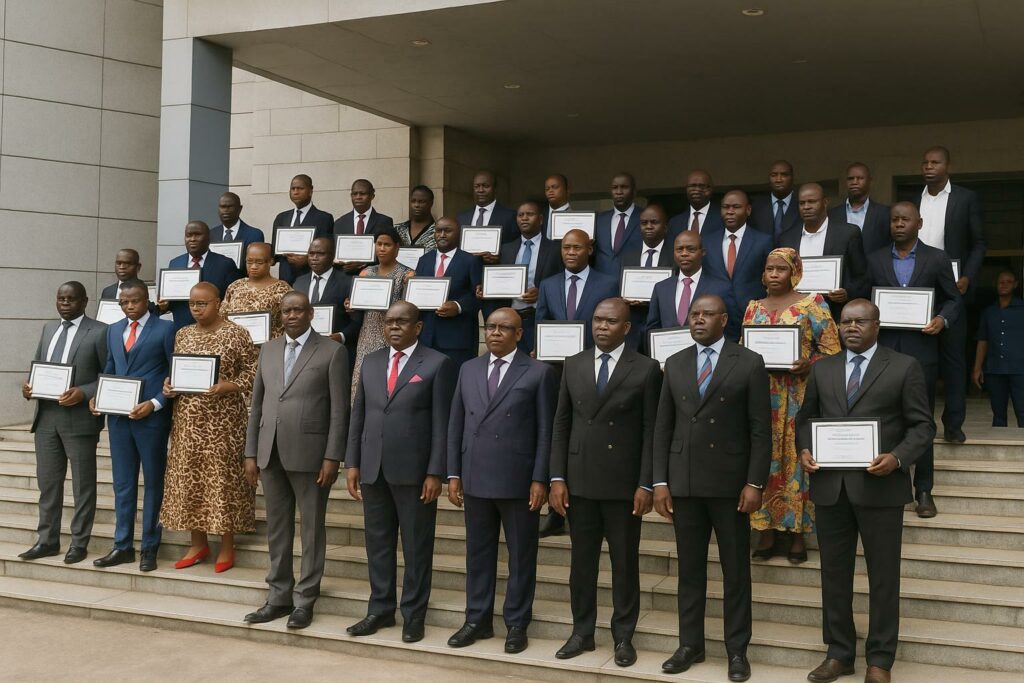Capacity-building underscores Brazzaville’s governance priorities
On 3 September, within the marble halls of the Ministry in charge of State Reform, Minister Delegate Luc Joseph Okio placed freshly printed certificates into the hands of thirty civil servants who had completed a rigorous course in designing and implementing results-oriented monitoring and evaluation systems (Les Dépêches de Brazzaville, 3 September 2023). The symbolic gesture crowns a blended training programme that unfolded between 12 and 16 May, coupling virtual modules with face-to-face workshops in Brazzaville.
A results-based monitoring ethos takes root
Addressing the recipients, the minister reminded the audience that modern public management is no longer satisfied with procedural compliance alone. “These mechanisms do not merely measure progress; they guarantee the relevance and effectiveness of our development programmes in a context where accountability is more than an imperative,” he stated. By framing monitoring and evaluation (M&E) as a core discipline rather than an afterthought, the government signals a strategic pivot toward evidence-driven policymaking that resonates with contemporary diplomatic conversations surrounding transparency and value for money.
Strategic Plan 2025-2029 signals systemic ambition
Beyond the certificates themselves, Minister Okio unveiled the forthcoming Strategic Reform Plan 2025-2029, crafted after a diagnostic review of national M&E capacities. The document aims to entrench a culture of results across every department, ensuring that each franc invested by the state can be justified by verifiable outcomes. “We want probative data. Every project must be measured and adjusted with rigour,” the minister insisted, articulating an agenda that aligns institutional performance with citizen expectations and international benchmarking alike.
Training curriculum anchors methodological rigour
The May workshop exposed participants to logical frameworks, indicator design, baseline construction and data-quality assurance, equipping them to supervise programmes from conception to impact assessment. According to Roger Ongouaomo-Moké, counsellor for reform evaluation and lead architect of the course, the qualification confers “heightened responsibility” upon its holders. His observation echoes a wider recognition that technical literacy in M&E constitutes an indispensable asset for civil services navigating complex socio-economic landscapes.
Certified officials as vanguards of administrative renewal
Expectations now run high for the thirty newly certified officials. They are tasked with disseminating a results mindset within their respective ministries, creating feedback loops where data informs adjustments in real time. In practical terms, this entails drafting performance matrices, supervising field data collection and convening intra-ministerial dialogues on programme optimisation. As frontline ambassadors of reform, their conduct will indelibly shape the credibility of the wider 2025-2029 strategy.
Implications for diplomatic and development partners
For external observers and bilateral partners, the ceremony provides a tangible indicator that Brazzaville is operationalising the principles it espouses in regional and multilateral fora. The elevation of M&E from a peripheral function to a central governance tool may facilitate more structured dialogues with donors and international institutions, whose own frameworks increasingly hinge on demonstrable impact. While the immediate focus remains domestic, the reputational dividends of institutional rigour could resonate far beyond the Republic of Congo’s borders.
Sustaining momentum beyond certification
The sustainability of this initiative will depend on continuous professional development, budgetary backing and the political will to translate metrics into management decisions. Early evidence—illustrated by the minister’s unequivocal language—suggests that such resolve exists at the highest levels. Nevertheless, the transformative promise of monitoring and evaluation will be fully realised only when routine administrative practice internalises the discipline’s technical standards. In that endeavour, the thirty graduates stand at the fulcrum of change, bearing both the knowledge and the institutional mandate to steer Congo-Brazzaville toward a governance model rooted in accountability and measurable progress.

